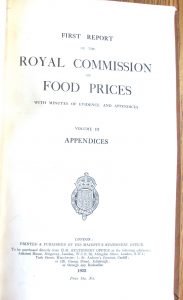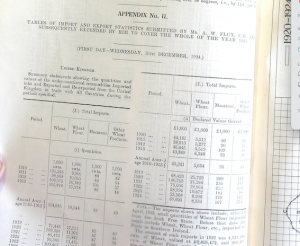The Departmental Committee on the Distribution and Prices of Agricultural Produce, generally referred to as the Linlithgow Committee, was proactive in its assessments and investigations of agricultural prices. Its remit covered the empire. The committee took its name from Victor Hope, 2nd Marquess of Linlithgow. He went on to chair a Royal Commission on food in India in 1928. Linlithgow, as the media called him, became the last viceroy of India: his 7-year tenure of office ended in 1943, amid scenes of chaos and civil unrest.

On December 11 1924, the second day of the 1925 Royal Commission, a senior MAF (Ministry of Agriculture and Fisheries) civil servant gave the government response to a raft of administrative measures recommended by the Linlithgow committee. Like a rabbit caught in car headlights, the MAF defence was more a limp lettuce than a fig leaf.
First up was a recommendation to standardise financial reporting for large companies such as United Dairies. MAF headed off further discussion, explaining that the government had “considered” introducing a bill, before playing its trump card: “The matter is now in the hands of the Board of Trade.” Next up, a suggestion that co-operative dairy schools should be revived is fended off with the assertion that a circular on the subject has been issued to all local authorities and “…steps are taken as opportunity offers.” Try getting that back out of the long grass.

The proposition that standing milk advisory committees should be set up to consider and discuss dairy industry issues as the need arose got short shrift. One of these bodies would cover Scotland, another would speak for the dairy industry in England and Wales: the topic prised about a dozen words from MAF: “Separate committees have been set up for England and Wales and for Scotland.” To finish the dairy section of the Linlithgow agenda, the committee urged the government to set and enforce minimum fat contents for whole milk cheese, cream and milk powder, which should apply both to imports and UK production. Sensing an imminent change of subject, the civil servant was more forthcoming. The health minister had made regulations that had come into force during May 1924. Meanwhile, the ministry of agriculture was: “…conducting investigations with a view to determining what standards, if any, may be adopted in respect of whole milk, cheese, and single and double cream.” Nothing gets past a pen pusher.

The Linlithgow committee and its extensive social network existed to promote the interests of landowner members. Its purpose was to develop a consensus around what constituted good practice, modern management and new routes to market. A fair proportion of these families would have benefitted from the compensation lavished on former slave owners: it never occurred to anyone that former slaves had a stronger case for reparations.
The Linlithgow committee (Lc) makes further recommendations, some of which I will list here, with MAF responses where relevant, including paras 258; 260; 302 and 303.
Para 258
Lc urges colleges and local authorities to train students in dairy production, as well as the prevention of spoilage. MAF agrees that this is worthy plan, even if some sites have needed assistance to reinstate standards.
para 260
Lc warns that whey is an ongoing problem, with little prospect of being profitable. MAF reports that a pilot plant has been transferred to Reading university, where development work is in hand.
The topic turns to commercial sharp practice: paras 209, 302 and 303. Since MAF replies to all these items in a single paragraph, I will add MAF’s response at the end of this post.
Lc is concerned that the practice of “averaging returns” is illegal and “not infrequent”. Growers should be checking all the entries on their invoices, the committee warned. Growers were not impressed. Another scam on similar lines started to rear its ugly head. By logging into the sales system under multiple identities, traders could cover their tracks and extract money from linked systems without being caught out.
Faced with significant numbers of food traders routinely breaking laws that may or may not have been enforceable in the first place, MAF resolutely turned its back and looked the other way:
“Efforts are being made to secure voluntary agreement between both sides of the industry on the points raised in their recommendations. If these efforts do not meet with success, it will be necessary to consider the introduction of legislation to deal with the points at issue.”
It would be reasonable to assume that it is the task of government to enforce existing laws and to review legislation that fails to meet the changing needs of the country. Accepting the status quo and asking both sides to play nicely in future resolves nothing. The problems will not go away without appropriate action; on the contrary, they will degenerate into crises.
For discussion of this theme in a more recent context, go to the contents page for France Loses Out and follow the links to individual topics.
More follows later: a series of related charts and some of the original text will be available in the near future.



Leave a Reply